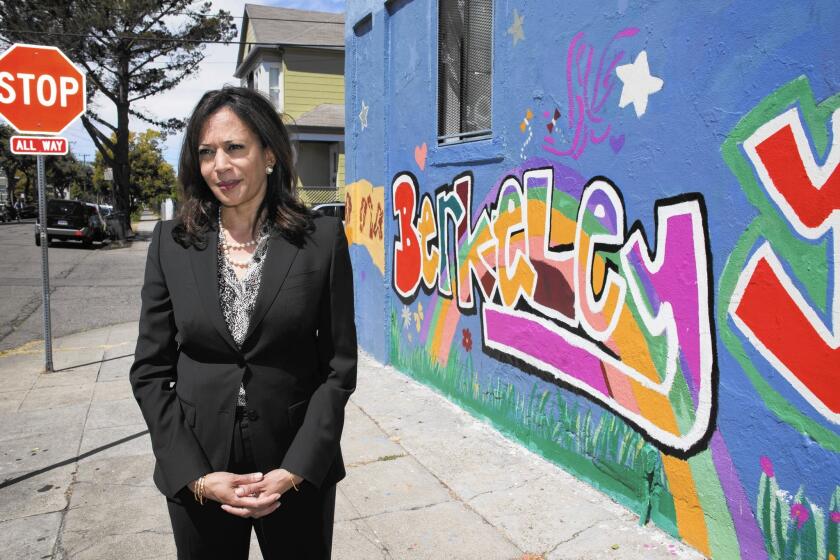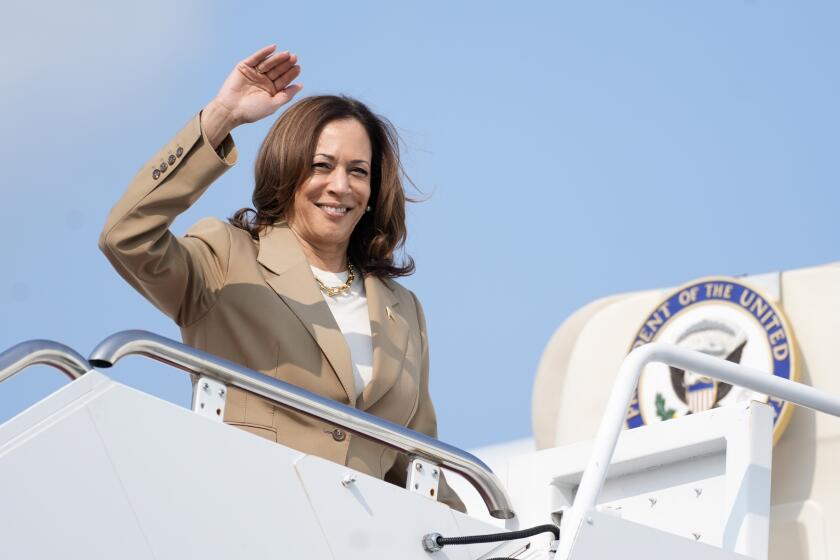Trump, in contentious interview, makes false claim about Kamala Harris’ Black identity
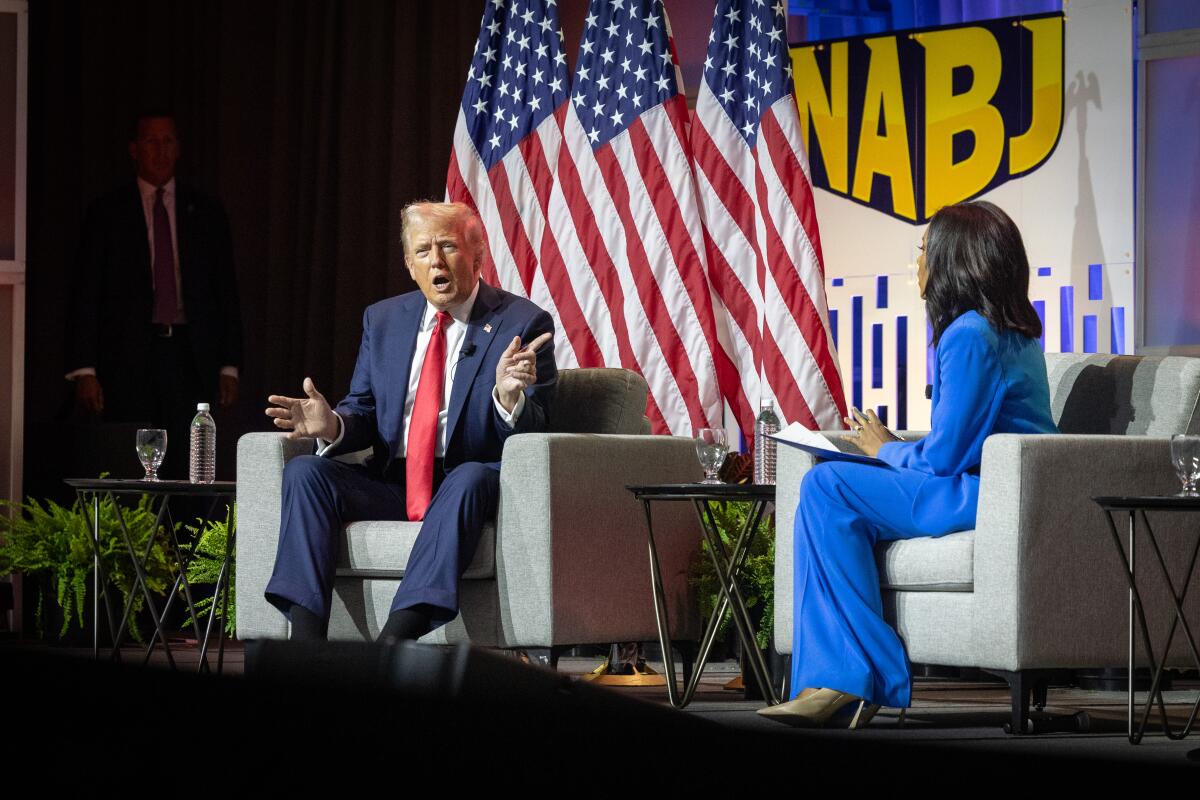
- Share via
CHICAGO — Former President Trump and a Black reporter engaged in a sometimes incendiary discussion of race Wednesday, with the Republican candidate saying he was the best president for Black people since Abraham Lincoln and falsely accusing Vice President Kamala Harris of shifting the way she described her own racial identity.
Trump’s session with three reporters at the annual convention of the National Assn. of Black Journalists was heated from the start, when Rachel Scott, senior congressional correspondent for ABC News, rattled off a series of Trump’s inflammatory comments — including the claim that former President Obama was not born in the U.S. — and asked why Black voters should trust him.
“I don’t think I’ve ever been asked a question in such a horrible manner, first question,” Trump retorted. “You don’t even say, ‘Hello, how are you?’ Are you with ABC? Because I think they’re a fake news network and terrible, by the way. I think it’s disgraceful.”
Trump then said he had started “the greatest programs ever for Black workers and Black entrepreneurs,” referring to opportunity zones for Black businesses, and to his work to help “save” historically Black colleges and universities when they were “stone cold broke.”
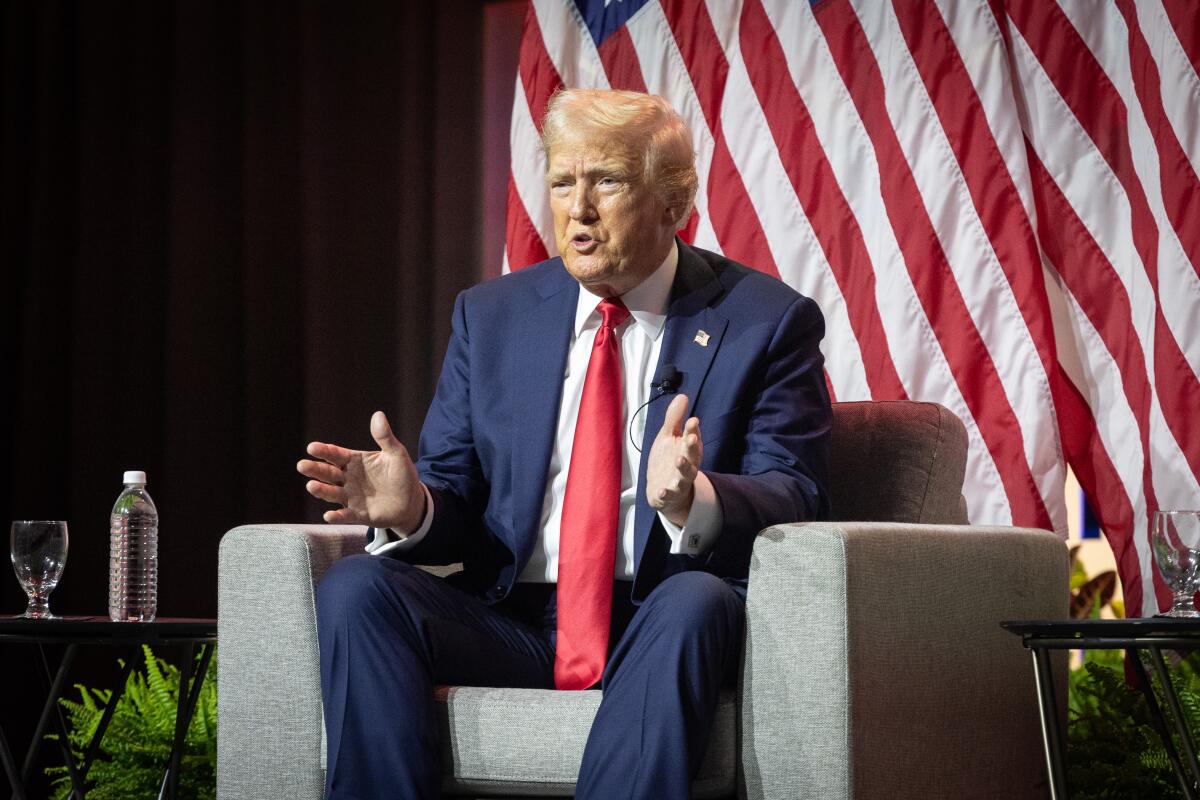
Trump’s 36-minute session at the annual convention remained intense, as he blamed the organization for starting the event an hour late and charging he had been “invited under false pretenses,” believing that Harris — his expected opponent in the November election — would also be attending.
When pressed by the ABC reporter to say why Black voters should trust him, Trump said he had already answered the question and added: “I have been the best president for the Black population since Abraham Lincoln.”
The tension between Scott and Trump continued when the correspondent asked him if it was acceptable to suggest, as some Republicans have, that Harris’ ascension as his opponent amounts to a “DEI hire,” a reference to policies that encourage diversity, equity and inclusion in hiring.
Not answering the question directly, Trump accused Harris of shifting her racial and ethnic identification over time, suggesting she had a lack of “respect” for her racial identity.
The former president contended that for years Harris “was always of Indian heritage, and she was only promoting Indian heritage. I didn’t know she was Black until a number of years ago, when she happened to turn Black and now she wants to be known as Black. So I don’t know. Is she Indian, or is she Black?”
“I respect either one, but she obviously doesn’t,” Trump continued.
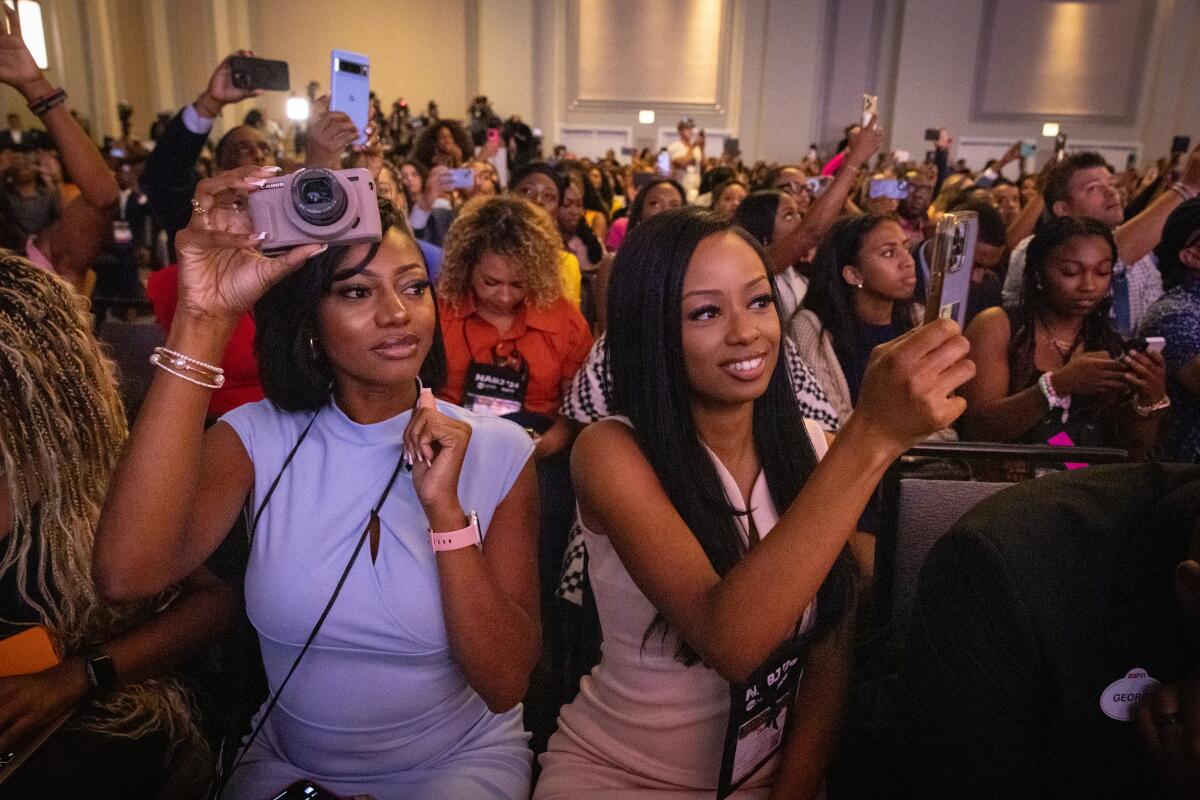
One obvious early acknowledgment by Harris of her racial identity: She attended Howard University in Washington, a historically Black institution.
The temperature of the sessions cooled when Harris Faulkner, a Fox News anchor, took over the questioning and Trump returned to old themes — particularly decrying the “invasion” of illegal immigrants, which he said was “destroying” America.
“I will tell you that coming from the border are millions and millions of people that happen to be taking Black jobs,” he said, later adding: “They’re invading. They’re invading. It’s an invasion of millions of people, probably 15, 16, 17 million people.”
He quickly pivoted to blame Harris for the spike in immigrants crossing the U.S.-Mexico border, noting that the vice president had been placed in charge of overseeing the issue by President Biden.
“Kamala is allowing it to happen,” Trump said. “She’s the border czar and she’s the worst border czar in the history of the world. There has never been a border czar like this.”
Trump later suggested that immigrants had been allowed in the country as part of a scheme to pump up voting for Democrats. PolitiFact noted that Trump and his campaign have never provided evidence of such a plot and that reports of noncitizens voting are extremely rare.
When asked about his previous statement that he would consider pardoning the rioters who invaded the U.S. Capitol on Jan. 6, 2021, injuring 140 police officers, Trump attempted to shift the discussion to protests by the political left.
The Republican presidential nominee said that just last week supporters of Palestine “viciously attacked our government,” during a Washington protest, adding: “They fought with police. They fought with them much more openly than I saw on Jan. 6.”
Authorities arrested 23 people in the unrest, connected to Israeli Prime Minister Benjamin Netayahu’s visit to Washington, according to news accounts. Some in the crowd scarred monuments near the White House with graffiti. A spokesman for the union representing U.S. Park Police said that only 29 officers were available that day, limiting enforcement.
By the start of this year, 1,265 defendants had been charged for the Jan. 6 assault on the Capitol, with more than 460 locked up for their actions, according to the U.S. Attorney’s Office in the District of Columbia.
The nearly-50-year-old NABJ is meeting for its annual convention in Chicago, with about 2,000 of its members gathering for the appearance by the former president.
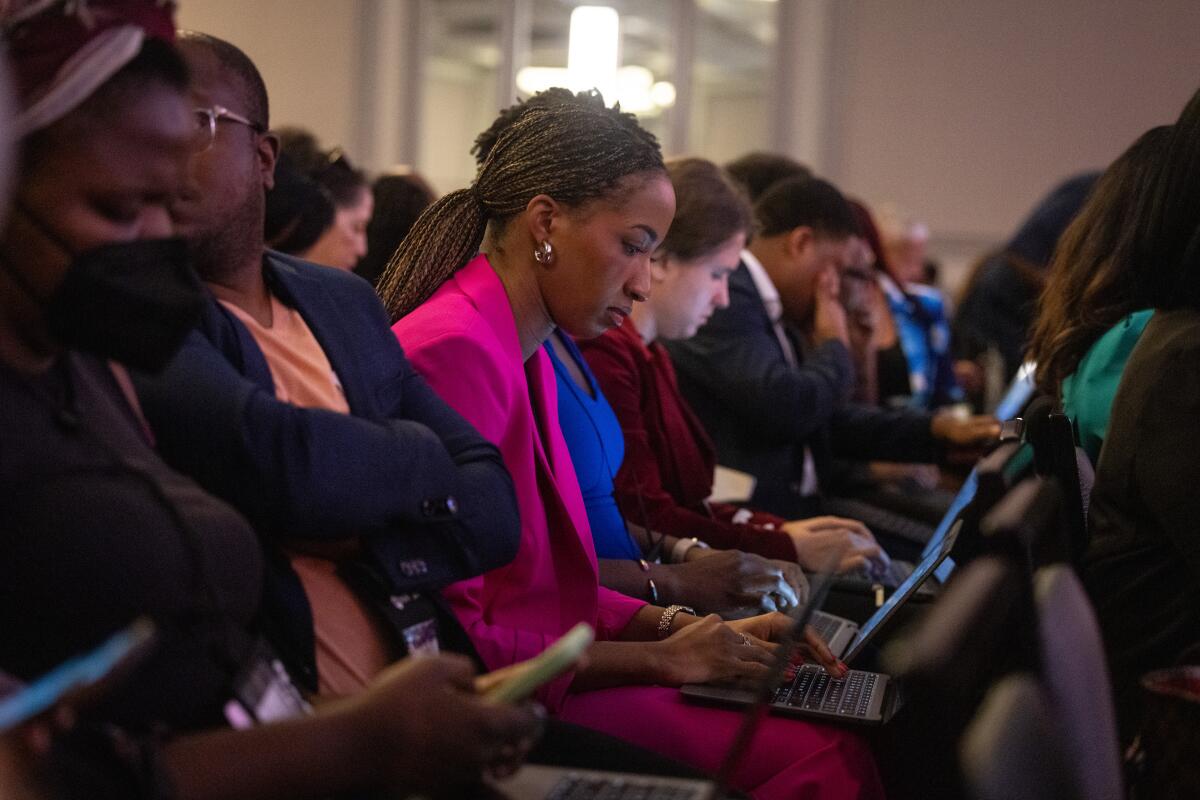
Prior to the session, some NABJ members had protested that Trump should not have been invited because of his past actions, including harsh comments about some Black journalists. But others, including the group’s president, said it was tradition to invite the candidates from both major parties in election years.
Karen Attiah, a columnist and global opinions editor with the Washington Post, announced Tuesday she was stepping down as co-chair of the convention.
“While my decision was influenced by a variety of factors, I was not involved or consulted with in any way with the decision to platform Trump in such a format,” Attiah said in a social media post.
Others said that the role of journalists is to report on political figures, even ones whom they might disagree with personally. Some took to social media to suggest tough questions for Trump, including about his stance on the Central Park Five.
A Latino VP pick for presidential candidate Kamala Harris is unlikely. Despite the Democratic party’s courting of their vote, it’s not surprising.
That group of young Black and Latino men was accused in 1989 of the assault and rape of a white woman running in New York City. Another man later confessed to the crime and their convictions were vacated in 2002. Trump took out a full-page newspaper ad suggesting the death penalty for the men and, years later, would not apologize for his stance.
Harris’ office said she was not able to fit the convention into her schedule, but the NABJ said it was “in conversation” with her campaign and hoped to schedule a Q and A with her in September.
Trump’s appearance drew boos and cheers, with one attendee walking out as he questioned Harris’ racial identify and another screaming, “Sir, have you no shame?”
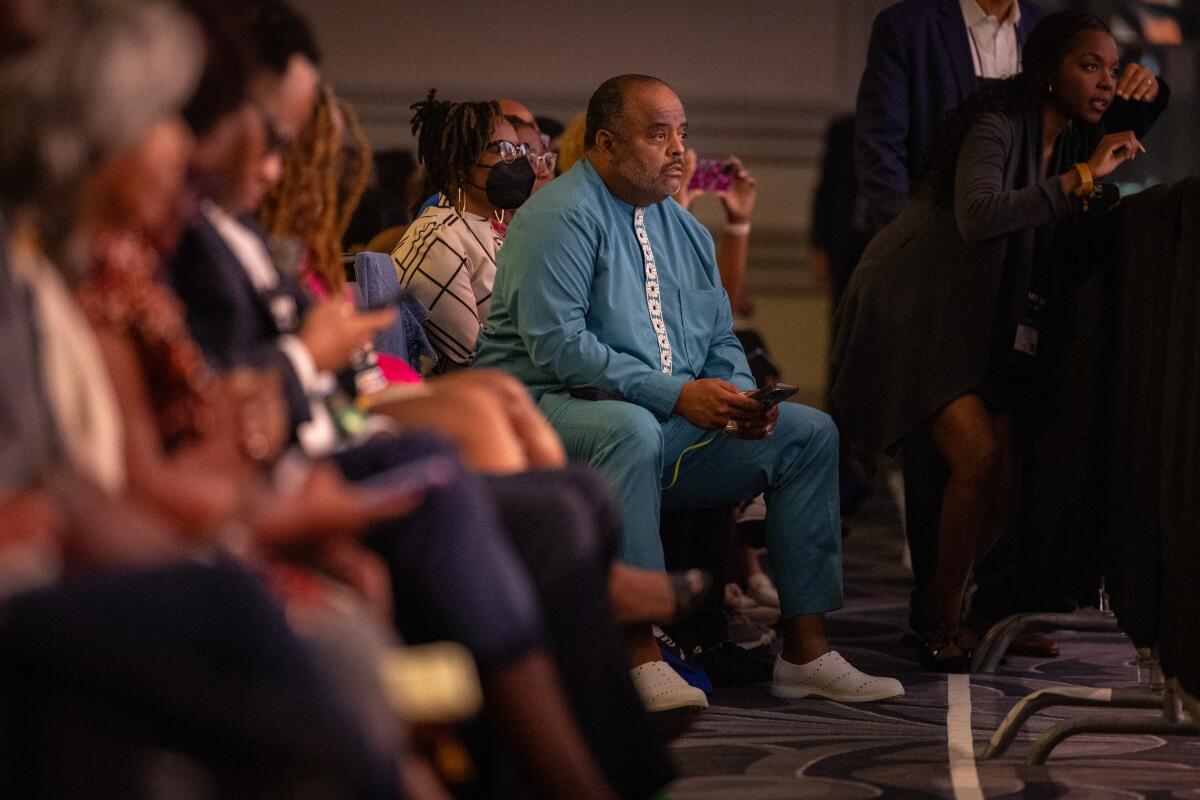
Hope Moses, 22, said it was important for her to be in the room to bear witness as a student reporter and a young Black voter. Moses, a Milwaukee native and graduate student at Northwestern University, called the session a unique opportunity to hear Trump’s response to “some of the pressing questions Black voters wanted to know.”
Afterward, she felt Trump had gone “a little bit off track.” It disturbed her to hear the former president acknowledge he did not know the details of the shooting of Sonya Massey, an unarmed Black woman shot to death earlier this month by an Illinois sheriff’s deputy.
“I don’t even remember him offering his sympathies and really connecting with the audience and understanding that each of us could’ve been her.” Moses said. “Most people in the audience can agree that this was entertaining but wasn’t necessarily informative.”
Jennings reported from Chicago and Rainey from Los Angeles.
More to Read
Get the L.A. Times Politics newsletter
Deeply reported insights into legislation, politics and policy from Sacramento, Washington and beyond. In your inbox three times per week.
You may occasionally receive promotional content from the Los Angeles Times.
